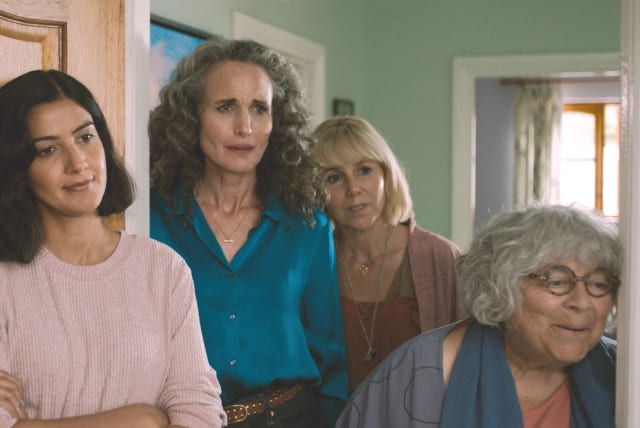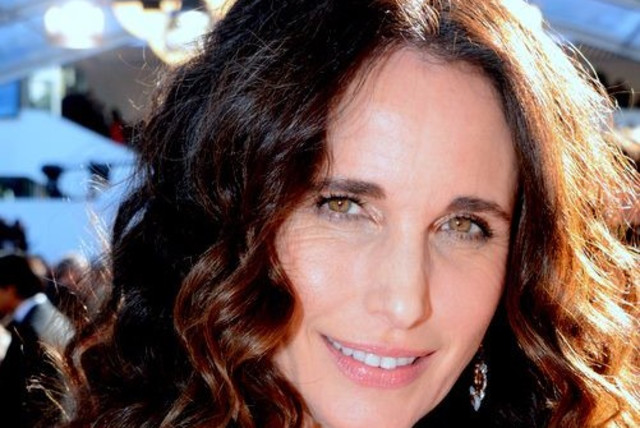‘My Happy Ending’ tells a story of life and death - review

Playing a has-been Hollywood star quietly seeking treatment for cancer in an English hospital, Andie MacDowell radiates energy, fear, ego and even humor in her most interesting role since 1989.
In Hollywood, there is a saying, “Death is easy, but comedy is hard.” Andie MacDowell, who has long made comedy look easy in such movies such as Groundhog Day, gets the substantial role she deserves in My Happy Ending, which opens in theaters all over Israel on June 1, a movie in which her character contemplates her own death.
Playing a has-been Hollywood star quietly seeking treatment for cancer in an English hospital, she radiates energy, fear, ego and even humor in her most interesting role since Sex, Lies, and Videotape in 1989.
MacDowell playing a cancer patient is just one unexpected element in a movie that is unusual in many ways. Directed by two Israelis, Tal Granit and Sharon Maymon (who cowrote the short film Skin, directed by Guy Nattiv, which won an Oscar in 2019), it is an adaptation of a play by another Israeli, Anat Gov, which was reworked for the screen by Rona Tamir. Gov, who was married to singer Gidi Gov, was a writer who died in 2012 of cancer. She was outspoken about her diagnosis and her life as a cancer patient for years before her death. Her play was not the usual “battle with cancer” story, but a glimpse into the lives of women with cancer and the choices they make.
While the movie betrays its theatrical origins by its setting – it all takes place in one afternoon in a chemotherapy clinic at a hospital – its wonderful cast, especially MacDowell and the actresses who appear alongside her, and the directorial decision to open out the story by filming the characters’ fantasies, create a movie that is visually and emotionally rich.
The character of Julia
At first, the story is focused on MacDowell’s character, Julia, who comes to the clinic thinking it will give her the privacy she craves. Performing in a play on London’s West End that has just flopped, she is in denial about the gravity of the stage 4 colon cancer with which she has just been diagnosed. She has not told anyone about it, not even her daughter or her longtime manager, Nancy (Tamsin Greig, who starred in the brilliant series about British comedy writers in Hollywood, Episodes). But there are no private rooms, and a flimsy curtain can’t stop the other patients there from overhearing her, or her from hearing them. As they figure out how dire her situation is before she has fully absorbed it – “How many stages are there?” she asks, making it clear she couldn’t concentrate when her doctor gave her the diagnosis – an intimacy blossoms between the four women. They all have different kinds of cancer and very different lives, and the contrasts among the choices they have made gives MacDowell a crash course in how to handle her new reality.
Mikey (Sally Phillips, an actress who often plays a wisecracking best friend, as she did in the Bridget Jones series) has lived an unconventional life and was estranged from her daughter when she was first diagnosed. But the cancer has led to her reconciling with her daughter, and she is almost grateful for it. Judy (Miriam Margolyes, a veteran British character actress, who has appeared in almost 200 movies, including The Age of Innocence and the Harry Potter series) is fiercely realistic about her chances and reveals that she was actually born in Auschwitz and has always refused to take life for granted. Imaan (Rakhee Thakrar) is a young wife and mother, as well as an ambitious student, who was diagnosed during her pregnancy. Her religious faith somehow allows her to see her diagnosis as good luck – if she hadn’t been pregnant, she might have been diagnosed too late and not have any chance of survival at all. The others have trouble understanding her attitude – how can getting cancer at 26 be good luck? – but they have come to respect her.
Julia, who comes to the hospital with the idea that her cancer is a problem she is going to take care of via chemotherapy in time for her daughter’s wedding, learns during the course of the film how serious her prognosis really is. As her manager makes clear, for years Julia has not thought past what her next role would be, but now she takes a hard look at her life and her chances. As she turns into a much more substantial character than she seemed at first, we can enjoy watching this transition – a condensed and heightened version of what might actually happen in the course of many months.
The episodes where the women share their fantasies – which are realistically rendered – are tricky and some work better than others. My favorite was Julia’s, in which they all enjoy the rich pastries she has not allowed herself to eat in years.
In the end, the movie is far more entertaining than the premise would suggest, and it movingly represents Gov’s plea for us to speak more openly and realistically about death.
Jerusalem Post Store
`; document.getElementById("linkPremium").innerHTML = cont; var divWithLink = document.getElementById("premium-link"); if (divWithLink !== null && divWithLink !== 'undefined') { divWithLink.style.border = "solid 1px #cb0f3e"; divWithLink.style.textAlign = "center"; divWithLink.style.marginBottom = "15px"; divWithLink.style.marginTop = "15px"; divWithLink.style.width = "100%"; divWithLink.style.backgroundColor = "#122952"; divWithLink.style.color = "#ffffff"; divWithLink.style.lineHeight = "1.5"; } } (function (v, i) { });

